- Latest articles

Do you know how to handle little things that drive you nuts?
The other day, I misplaced my car keys when I was in my office building, which is a huge place. It has a large first floor with many side rooms, an enormous basement, and various offices upstairs. There were so many places my keys could have been since I went up and down the stairs all day long. Saying a quick prayer, I retraced my steps, trying to remember where I laid my keys down. After walking around for a while, I suddenly remembered where I might have put them and ran upstairs to one of the offices. Sure enough, there were my car keys. Thank you, Jesus!
I find that there is always a lesson lurking in the day’s events—if I stop and reflect. Just as parents are alert for and use ‘teaching moments’ to educate their kids, so, too, does God use teaching moments to form us. They are often small grievances, for example, driving all the way to the store and realizing you forgot your wallet. Or worse, getting to the checkout with your cart full of groceries before you realize you don’t have your wallet. Or locking your keys in your car—and worse, seeing that you also locked your cell phone in there!
Seeking Fervently…
These small events can cause frustration and anger, or we can choose to see them in the light of God’s training and disciplining us. If we choose the second option, we can say: “Okay, Lord. I choose to praise You and thank You because Ephesians 5:20 says: ’Giving thanks to God the Father at all times and for everything in the name of our Lord Jesus Christ.’” When we lose our keys and are searching for them, we can say: “Thank You, Lord, for this trial of inconvenience.” As fervently as I am seeking for my keys, I want to fervently be seeking You. “Your face, Lord, do I seek.” (Psalm 27:8)
If we can perceive God’s loving hand in allowing these things to happen so that they can help train and discipline us, then we can smile and even laugh at daily annoyances. This is something that a priest taught me. Father Jack used to call his guardian angel ‘Laughing Boy’ because of these kinds of little mishaps. If he locked himself out of the car, missed a ride, or couldn’t find a paper he needed, Father Jack would say: “Laughing Boy is at it again!” And he would chuckle.
Father Jack had learned and taught us an important lesson–don’t take yourself too seriously. The ability to laugh at yourself and at the little grievances of the day helps to keep a smile on your face, and then you will radiate joy to those you meet.
Remember, there is always a lesson. Take time to ponder and say: “Okay, God. Here I am. What are You trying to teach me in the events of this day?” Then look at how you responded. Did you learn something and grow in virtue, or did you react badly?
Don’t worry if you fail. There will be more pop quizzes tomorrow.
'
Is it a miracle or a coincidence?
I had been working on an article for several days, arduously trying to get my facts right so that the end product I presented was as authentic as possible. Then, all of a sudden, I hit the wrong button, and almost all of what I had written over the past few days disappeared from my entire computer. Nothing worked, no matter how much I tried and how many IT experts I consulted.
I had two choices either to try again fruitlessly to retrieve my lost work or to rely on the power of prayer to somehow miraculously retrieve it.
Desperate Times, Desperate Measures
In the meantime, I felt that I had made a copy of the unfinished work somewhere in the process. So I searched everywhere, in every nook and cranny, in every plastic bag I now use as my case or valise, desperate for a copy of this lost venture, but without success. Trying to replicate all those hours of thought and written words was such a dirge, but I tried to console myself.
I desperately prayed to all the Saints of God, particularly one of my favorites, Saint Anthony of Padua, the patron Saint of lost things.
My eagerness to finish the article caused me so much anxiety that I even lost sleep over it. I couldn’t content myself until I found the missing half of my article. This continued until the weekend, when I finally decided to dive into a new version of my original idea, forfeiting any hope of finding any semblance of my original thoughts. I sat by my computer, hit my story on the desktop, and thought about where I was to begin revising my original story.
Suddenly, I glanced towards my printer, where I spotted a sliver of four pieces of paper protruding from my printer. I ignored it because it must be a remnant of what I was working on earlier. However, before hitting the print button on my latest endeavor, I extracted the A-4 pages. Surprisingly, the article’s title matched exactly what I had been desperately searching for over the last week. I couldn’t believe my eyes. How could this be so? An article that I, and every close and known acquaintance of mine, had been unsuccessfully searching for over the past week or so surprisingly appeared on my printer out of the blue.
This spiritual experience left an indelible mark on my psyche. I know we leave so many existential happenings to ‘coincidence’. I realized how gracious our God is in allowing His Holy Angels and Saints to come to our aid with the slightest requests.
'
Discover how a simple snowflake can inspire you.
As I drove to the Church, the snow that was supposed to turn to rain continued to fall. Individual flakes hit my windshield, quickly revealing their uniqueness before melting away.
By the time I exited the Church after Mass, the snow lightly blanketed the ground. It was beautiful! Dressed in white, the barren farmland and the trees that had shed their colorful leaves no longer looked so desolate and dead. Despite the cold, the snow spread a sense of hope through the air.
Of course, my children were hoping the snow would continue so that they would not have to go to school. In my part of the world, snow does bring school-age children such hope and joy. But the feeling I had that day walking out of the church was different.
Standing amid the falling flakes, a verse from Psalm 51 came to mind: “Wash me, and I will be whiter than snow.” Therein lies the hope I felt – the knowledge that God loves me despite my weaknesses and sins. I need only to ask for His forgiveness and supernatural help to overcome them. He wants to cover me with His love and mercy like the snow falling gently on the earth.
Thriving in Grace
I took solace in the gradual covering. Our Lord is patient with us. He does not dump graces on us but allows us time for transformation. He gently leads us on the path of conversion. As I gingerly walked across the parking lot, I appreciated the baby steps we take on our journey that leads us to become the saints God is calling us to be. He delights in even our smallest progress.
By afternoon, that which was a field of overturned dirt was now a woolen blanket. How amazing that those little flakes gathered together make such a difference! Such is the transformative power of grace!
At every Mass when we receive Holy Communion, our souls are washed clean in the Blood of the Lamb. With each sacramental confession, we are reconciled to God and to one another. The ‘dirt’ from sin that stains our souls is washed away by the graces bestowed in these two powerful yet gentle Sacraments.
Then, God sends us out into the world. Each of us, as unique as a snowflake, has our own gifts and talents. We share the Gospel in our little part of the world. Perhaps we feel like we don’t do enough, or aren’t effective enough. We feel as tiny as that snowflake. But consider how God needs each snowflake to do its little part to cover the land.
Together, we can change the world! I do not have to do it all by myself. Neither do you. We just need to land where God places us and be the unique person He created us to be, spread God’s love, and make known all the good He does for us. The world will be a brighter place if we do.
'
In a remote village, there lived a family with identical twin brothers. They were so similar that even their parents could not tell them apart. The older of the twin brothers grew up in deep faith and led a good life, while the younger brother was led astray. The younger son’s plight left the parents so heartbroken. As their life drew to a close, all they wished for was the return of their younger son. The elder son promised to do everything to convert his younger brother.
One day, a curfew was declared in their village. The younger son, a rebel, mocked the officials and even lashed out at them. This situation escalated and resulted in the death of a few soldiers. The whole village, in agitation, went out in search of him. Early the next morning, before sunrise, the younger brother somehow made his way to their backyard, where his older brother was waiting, and fell at his feet. After listening to all that had happened, the older brother realized that his younger brother was truly repentant from his heart.
Not wasting any time, he took his younger brother for a bath and provided him with clean clothes to wear. By the time he came out, the older brother was already wearing his blood-stained clothes. By then, the mob was banging on their door. The elder brother rushed to the banging door; people beat him and got him arrested. He was sentenced to death.
The grief-stricken younger brother visited his older brother in prison and burst into tears, wanting to confess the truth. The older brother put his arms through the bars and held him close, making him promise: “This truth should be known only to us, our long-departed parents, and to God alone. All that I have earned is yours. My good reputation, wealth, status…I have taken all that is yours, but you have this beautiful life to live. Take care to live it out fully well.”
We do not know whether this story is true or fiction. But one thing is for sure—2000 years ago, an older brother gave up His whole life for us younger brothers and sisters at the Cross. He died in exchange for our sinful lives so that we may have new life in Him.
'
Do you know how to walk in grace without losing your identity?
When I became a teenager, two things changed in my life—my faith blossomed, and so did my love for fashion. It was around the same time I experienced a radical conversion of heart in the spiritual areas of my life that I simultaneously felt pulled to express myself through clothing. I went from Mass once or twice a year to several times a week, began reciting daily prayers, and became immensely involved in my parish’s youth group. At the same time, I went from wearing the same style of black leggings with a different color basic tee-shirt every day to wearing dresses with meticulously planned hairstyles and coordinating jewelry.
Both these shifts occurred gradually at first, but soon, I made the choice to pursue them radically. I felt for a long time that there was greater truth to be found in the Catholic faith than in the ordinary life I was living. I also felt that the way I was dressing was not a true expression of myself and that I desired a change. These two shifts in my life seemed at first inherently unrelated, and the correlation was something I didn’t even identify until several years later. One is of much greater importance than the other, but as I look back, I see a connection I never realized earlier.
Styling in Grace
In a society that has turned away from faith, tradition, and God altogether, the choice to pursue a religious life is a radical one. It takes courage to act as a witness to the truth and follow a path that differs greatly from the one we are encouraged to take and the one followed by most of those around us. Though not quite so drastically, the choice to dress unconventionally can also be an isolated, unusual path and one that can have a greater correlation to a life of faith than we would at first expect. Our personal style can act as a reflection of who we are interiorly. It can also challenge us to break free of conformity to societal expectations for our appearance. This, in turn, helps us grow in the pursuit of truth and living a life for Christ, the clearest path of non-conformity. The small, worldly choices we make day to day can help mold our interior and spiritual lives. As we dress with intention, we remind ourselves to live with intention. As we develop our physical style, we discover more of who we are and, consequently, who God made us to be.
While excessive preoccupation with one’s appearance can, of course, lead to the vice of vanity, there is a gift to be found in the enjoyment of style. Cultivating personal style differs from being overly engrossed in our physical exterior. Vanity comes from this concern and obsession.
When we dress in an outfit that boosts our confidence and expresses our individuality, this allows us to be free from worry. When we are no longer concerned with dressing for anyone’s approval except God’s and our own, we don’t need to spend extra time fussing over whether our outfit will draw desired or undesired attention.
Dressing with intention is a way to recognize our dignity as children of God. When we dress up for Mass, we do so to show reverence and respect to the One we attend the Mass to honor.
When we dress modestly, we recognize the dignity of the bodies God has gifted us. When we dress with style, we acknowledge our worth and individuality, our identity as sons and daughters of a King. Just as wearing a miraculous medal or crucifix serves as an outward sign of an inward devotion and reminds us of our faith or even encourages prayer and other actions, our fashion can remind us of our identity and, consequently, how we should behave.
Expressing Modestly
I began to explore my personality through fashion at the beginning of my high school years. My love of old black and white movies was reflected in the vintage touches I would add to my outfits through a 1940s Victory Roll hairstyle or a swing skirt 50s style. My artistic flair would shine through the enjoyment I found in pairing patterns and eventually designing and sewing outfits myself. What began as this expression of the individuality God created, unique to me, soon evolved to capture clearly the most significant part of myself—my faith.
Upon beginning college, I began to dress liturgically to better connect with the Church and its various seasons. In October, for the Month of the Rosary, I would dress to mirror the day’s mysteries. On Mondays, I may wear light pink to recall Mary’s purity and the innocence of the Joyful Mysteries. On Tuesdays, I would dress in dark blues to encompass the sorrow of Christ’s passion. This aids the depth of my meditation upon these mysteries. Rather than simply devoting fifteen minutes to the recitation of the Rosary, I incorporate its message into my entire day. On Feast Days of Martyrs, I would often dress in red to reflect the great sacrifice these Saints made in giving their lives for the sake of their faith. This encourages a deeper connection with their stories and calls to mind the lesson of how we are to live our faith. For each Sunday of Advent I may dress in either purple or rose to coordinate with the liturgical colors as indicated by the Advent wreath’s candles.
God created all as unique, unrepeatable individuals. Our personal style can be an expression of this individuality. Whether a teenager in high school, a young adult, or nearing retirement age, there is a joy to be found in dressing for our vocation and dressing to honor God. We can do this through our attire by exhibiting the dignity that He gives us. Small, physical changes in our lives are a way to both inspire and reflect internal changes in our hearts and spirituality. Style is not a sinful act of vanity but can be embraced and used to develop our faith when we align it with God’s will.
'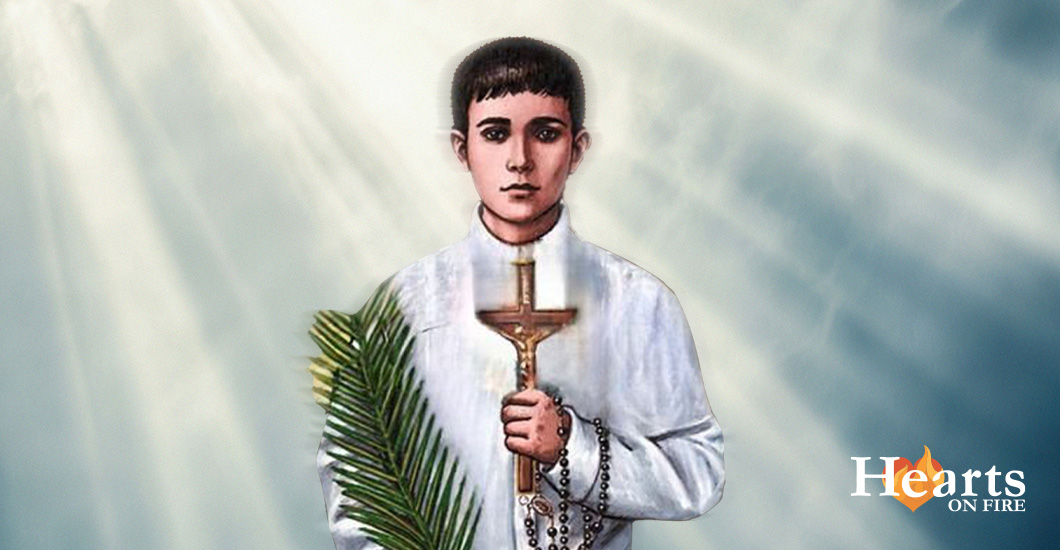
“Mama, do not let me lose the opportunity to gain Heaven so easily and so soon,” said the 12-year-old José to his mother.
It was 1926. Mexican Catholics were being persecuted for their faith—churches and parish schools were being closed, priests were being killed, and properties seized. The government finally forbade the public practice of Catholicism and made religious vows illegal. Peasants from central and western states in the country came together to protect the Church, and the Cristero War broke out.
Little José’s brothers were enlisted in the army, but his mother wouldn’t let him go. But he was so relentless that she had to give in to the consistent pleas to ‘go to Heaven easily.’ He started out as the flag bearer of the troop and was soon nicknamed Tarcisius, after the early Christian Saint who was martyred for protecting the Eucharist from desecration. He was promoted to be the General’s aide, and then bugler, riding along with him into combat and delivering orders.
José was eventually captured by the government soldiers and forced to deny his faith. He was made to watch the hanging of a fellow Cristero, but little José only encouraged the man in his martyrdom. Enraged, the soldiers cut off the soles of his feet and forced him to walk through the gravel-covered streets. In that intense pain, this little boy recited the Rosary for those who were hurting him. He sang songs of Our Lady of Guadalupe and proclaimed his faith loudly, even as he fell on the street several times.
José wrote several letters to his mother telling her he was happy to suffer for Christ. The soldiers offered him freedom if he proclaimed: “Death to Christ the King,” and his refusal resulted in fatal tortures. “I will never give in. Vivo Cristo Rey Santa Maria de Guadalupe,” said José as he took his last breath.
José Sánchez del Rio was canonized by Pope Francis in 2016 and is now revered as the Patron Saint of persecuted Christians and children.
'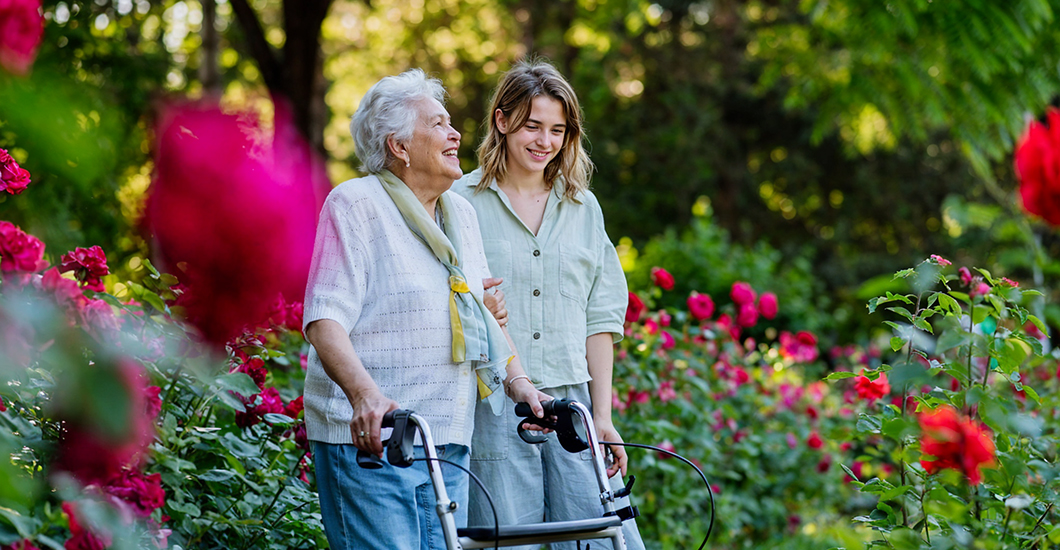
As a radio reporter, I had covered everything from Presidential visits to prison riots, trying to find the lasting meaning behind the news events of the day. It could be exciting, but also heartbreaking—serving as a witness to history. It was a job that I had loved from the very beginning, and I found it tough to let go of my work each day and ease back into life on the home front. It seemed as if there were always stories begging to be covered, and I was on a continual quest to discover the story that would lead to the next award—a recognition that would fill the hole within my heart—the God-shaped hole that only the Almighty could close and bring me true healing.
One of the final stories I covered as a secular news reporter was a seemingly simple feature about a service project at a nursing home. It would never make the national news, but it ended up profoundly changing my life in a way that I could not have anticipated.
A group of teenagers had been recruited to create a garden at the nursing home. The teens had experienced their share of troubles, and the organizer of the project thought that the physical labor might do their souls some good. The surprising element in this tale was how enthusiastic these young people were to create this garden. They went well beyond the requirements of the assignment, fashioning a floral masterpiece, complete with a waterfall. The garden proved to be an oasis of serenity for the senior citizens at the facility. One resident who was largely uncommunicative had been touched by the kindness of these strangers, and her corner of the world became more beautiful.
It occurred to me that these teenagers had overcome their personal struggles and had fulfilled the vision that God had intended. The situation made me think if I was living the life that God intended? Ultimately, I left the world of secular broadcasting behind and began working for a non-profit dedicated to the needs of pregnant women and their children. Ironically, through podcasts, radio, and television interviews, I am still using my voice to bring attention to stories that sing of the power and promise of the human spirit.
Speaking from experience, I can now say that life is, in fact, more beautiful when I allow the Master Gardener, the Creator of all things, to plan out my days. I have surrendered to Him and found a peace I never dreamed possible. I invite you to turn to Him and ask Him to direct your path. Once you let the Lord into the secret garden that lies deep within your heart, you would be surprised by the roses you find there.
'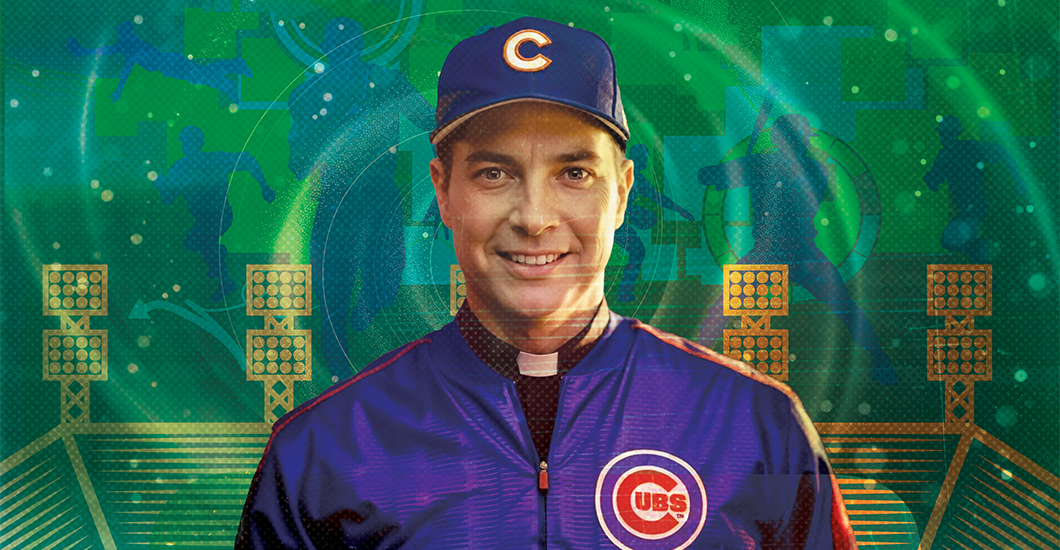
All that we have is a gift from Above, but ever thought what God intended when He gave it to you?
By the time I was born as the youngest of three boys, my family was Christian but non-practicing. My parents weren’t Catholic to start with, so on my first day as a freshman at Providence Catholic High School, I remember being scared to death because I had never met a priest or a religious sister. I did not know the first thing about the Catholic Mass but was told to attend all Masses at school. I had to take theology courses, too, but since my intention of going there was their baseball program, I didn’t mind.
Searching for Something…
As a 14-year-old, one of my biggest fears was being embarrassed in front of my peers–that I’d be asked the most basic question of the faith and be unable to answer. But Sister Margaret, who taught us freshman theology, never put me on the spot. One day after class, she waited at the doorway for me. I had every intention of walking right by, but she stopped me, looked into my eyes, and said: “Burke, you’re searching for something.” I tried to walk away, but again she stopped me and said: “Read this.” She gave me my first Bible.
That evening, after my baseball practice, homework, and dinner, I went to my room, shut the doors, and started reading the gospel of Matthew from the Bible. It really intrigued me in such a way that this became a habit. Gradually, theology became one of my favorite classes.
During the all-school Masses, I’d watch my friends go for Communion and be curious about their reverence for this piece of bread they were receiving. On one of our junior retreats, during the final day of Mass, I had a profound encounter with the Eucharist that made me realize the power of God within me.
The priest gathered us around the altar for the Consecration and Communion; I’d never been that close to the altar. During Communion, the priest came to each of us with the Eucharist; I didn’t know what to do. As he approached me and said: “The body of Christ,” my intention was to tell him that I’m not Catholic. But as I opened my mouth, he placed the Consecrated Host on my tongue. I felt at that moment the power of God going through my entire body. Though I now know that for an unbaptized person–for that matter, even a baptized person who doesn’t believe in the Real Presence of Christ in the Eucharist–it isn’t right to receive the Eucharist, the circumstances were such that I received my first Communion by accident! This incident changed my life in profound ways; I started off by studying more about the faith, and by the time I moved to Mississippi, I had become a Catholic who could receive Christ for real every day.
The Ebb and Flow
Baseball was going well, and the team was often ranked nationally. During my senior year, when I got into the zone, I hit a grand slam which got us to the College World Series. I was named the Most Valuable Player of that tournament. But a couple of errors in the following three games scrapped it all. During the World Series Major League Draft, eight of my teammates were drafted, but my phone remained silent.
I was crushed. I came home not knowing what to do. A couple of weeks later, my former high school baseball coach who had become a coach for the Chicago White Sox called and told me about the tryout to play professional baseball. That went well for me, as the next day, I signed a contract with the White Sox. But it didn’t go as I had planned. At the end of the season, they said: “Burke, you do everything well and nothing great, we’re looking for greatness.” They didn’t renew my contract. I kept on trying for a while, but finally, I had to face the fact that it was over. I was 23 years old with just a degree in Math.
Someone mentioned that there was a possible career in actuarial science, so I got a job and made a lot of money. But the stress was so low that it got boring, so I quit my job. After completing my Master’s from Ohio University, I landed a job with the Kane County Cougars, a minor league baseball team. After four years, I had two job offers on the table–two dream jobs in baseball at the same time!
I had just started dating Stephanie, who I’d met at the local church. One night, we were out for dinner and as we were leaving the restaurant, she said: “Let’s stop by the Church for Eucharistic Adoration.” Although I had been Catholic for at least eight or nine years, I had never heard of Eucharistic Adoration. She explained that we would be spending an hour of quiet prayer before the Blessed Sacrament. There, I realized that in silence, we encounter God.
We started to go every Tuesday night for an hour of Adoration, and I went from being afraid of silence to craving for silence. It became the most peaceful hour of my week. And in my heart, priesthood kept rising to the surface. It was like God was asking me to be a priest; a gentle invitation over and over. My family members, friends, and even complete strangers started coming to me saying they thought I would make a good priest. I felt that the Holy Spirit was working both internally and externally. So, I talked to Stephanie, and she told me that if that was my call, I had to follow it.
I had every intention of going to the seminary for a year and then returning to Stephanie. But as I walked through the doors of the seminary, I felt this peace that never went away.
It was during May of ‘98, the end of my first year of seminary, when I received a call from my dad asking to go home immediately because my mom was diagnosed with lung cancer, which had spread to the brain and liver. I dropped everything and went home. It was stage four. Though we kept hoping, two months later, she collapsed into my arms while watching television. It was horrific.
As I looked out the window and saw my mom’s car in the driveway, I imagined my mother coming face-to-face with God. God was not asking her about the kind of car she drove or how much money she made, but instead, something more fundamental, like: “Did you love the Lord your God with your whole heart, mind, and soul, and love your neighbor as yourself?” My mother, even though she wasn’t a churchgoer, had taught us about God’s love.
Better than Ever
I went through a crisis of faith. I even wondered if there was life after death. I was angry with God for taking away the most important person in my life, but as it turned out, God saw me through that.
I stayed and was ordained a priest. I thank God that I never made it to the major leagues because the joy and peace that I’ve experienced as a priest are far beyond anything that I had ever experienced on the baseball field.
I have not only been the Catholic chaplain for the Chicago Cubs, but I have also established Catholic sports camps, which are now expanding. It’s just one way God allowed me to assimilate what I love in sports and bring it into my ministry.
God gives us gifts for a reason, and he wishes for us to use those gifts for His glory, in ways that we never imagined.
'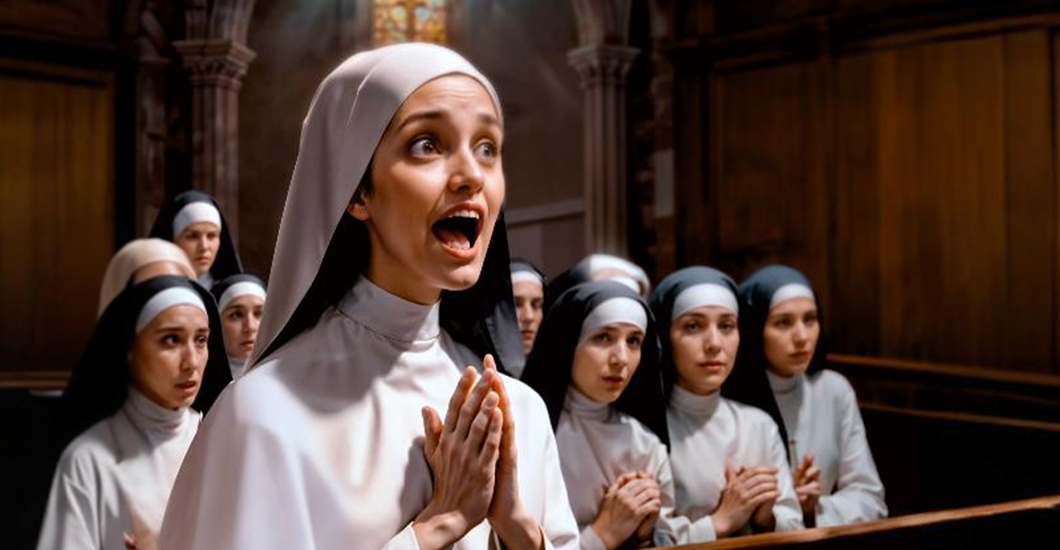
I had to finally accept that my singing was terrible, but I was not ready to give up, not yet…
“If God calls you to be a religious sister, He will give you what you need to become one!” This was one of the vaguest pieces of advice I received before becoming a postulant in the Dominican Sisters of Mary Immaculate Province. However, it proved to be the most practical advice in the first year of my religious life when I encountered a great challenge—my singing voice.
Of course, I can Sing!
I entered the convent thinking and believing that I had a beautiful voice; a voice that I could use to praise God. And I did use it to participate in the reverent worship that took place daily in the convent’s chapel. I sang the hymns and recited the divine office with all my being and of course, with all of my strength and volume. I thought that I pleased God and impressed everyone during our common prayer time. However, two weeks into the postulancy, my postulant classmate, Phi, revealed to me the painful truth that I cannot sing. With admirable courage, Phi put her hand on my shoulder and sincerely asked me one day: “Do you know that you sing flat?” Although I had taken a music appreciation class in college and had a sense of what Phi meant, I brazened myself: “What is flat?” “You know, it is when your voice goes off key and you cannot sing higher…” Phi tried to explain. Embarrassed, I pretended not to understand her. “I don’t know what you mean.” I walked away from her thinking that she must be jealous of my voice.
But this disillusionment did not last very long. One novice sister tactfully dropped a hint one evening before vespers without speaking directly about me: “What strange noise there is in the chapel these past few days!” I felt conscious of her words, but still, I did not accept the truth. My pride clouded my mind. However, another postulant, Karen, encouraged me: “If you can sing, sing loudly. If you can’t sing, sing twice as loud so as to get even with God.” I followed her advice and sang even louder than before to get even with God for not gifting me a lovely singing voice. My community was tortured every time I was in the chapel.
What if You Can’t?
It was only when I was offered voice lessons instead of the desired piano lessons like the other postulants that I came to the full realization of the truth—I must have sung horribly to have merited these lessons. My pride was deflated. I was dejected. Then, I remembered the advice that was given to me: “If God calls you to be a religious sister, He will give you what you need to become one!” In tears and embarrassment, I went to the chapel and told the Lord that I needed a singing voice good enough to offer Him praises without doing harm to the sisters’ eardrums. I added a twist to this request though—that it would also be a sign of my vocation as a Dominican sister if I could also cantor at the community’s Sunday Mass.
God met my request and challenge. But of course, He did not instantly grant me a miracle without having me sweat for it. That would totally spoil me! Yet like an excellent father, He allowed me to experience the pain of voice training and to persevere in daily practice. He also gave me what I needed, namely, time and space for voice lessons and a dedicated and patient voice teacher, Sister Anna Pauline. Through those weekly and rigorous private voice lessons, I gradually made improvements. At the end of the sixth month, I was asked to cantor at the community’s Mass and many times afterward.
I will Keep on…Singing
However, the definitive affirmation of my vocation as a Dominican sister came as a delightful surprise one day when I was teaching a religion class. While most of my kindergarten students were sitting quietly and listening attentively to my retelling of the story of the Good Shepherd, many were antsy and distracted. I decided to draw their attention to this loving story, so I sang the song instead. Gabby, who was stretching herself out on the classroom rug a little far off from the rest of her classmates, suddenly exclaimed: “Sister, you have a beautiful voice!” Then she moved closer to me. Somehow, my singing captured Gabby’s attention and the rest of the class that day.
So, for the rest of my years as an elementary religion teacher, I used that God-given voice to teach my students about God’s love. I am sure that God gave me a singing voice not to puff up my pride but to aid me in my service of His kingdom. My vocation is thus affirmed.
If God calls you to any vocation, be assured that He will give you whatever you need—even a singing voice.
'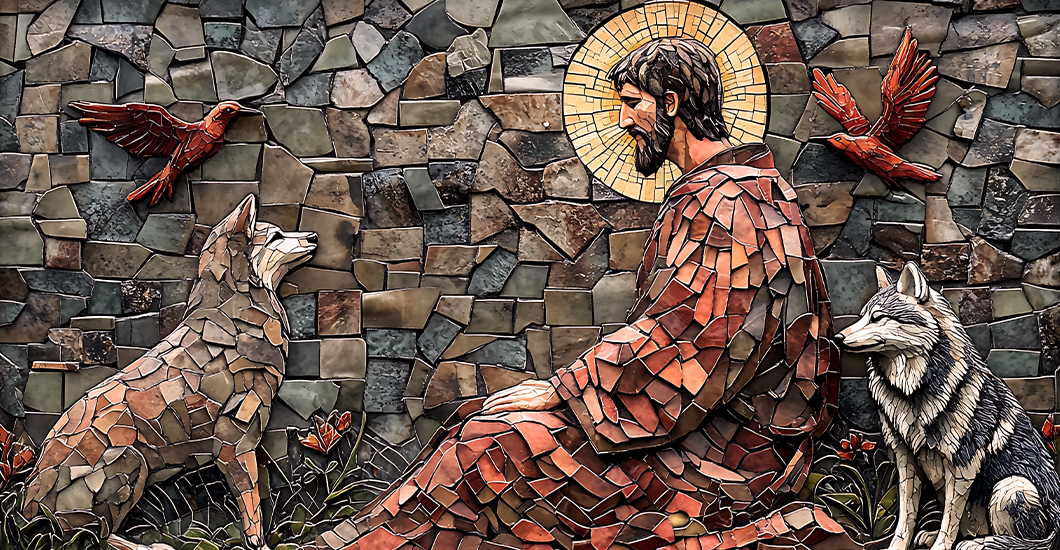
A man who walked the earth 800 years ago is still remembered for his simplicity…
Picture this: A young man from medieval Italy with a life of parties, fashion, and everything a man could have wanted back then. But suddenly, something changes. A pivotal moment, an ‘aha’ moment that takes his life on a whole new path. Meet Saint Francis of Assisi, the ultimate party animal who became a spiritual superstar! He is known for his flowing brown robe and love for nature. He had a way with animals that could make even Doctor Dolittle envious. Birds gathered around him, rabbits hopped at his feet, and even ferocious wolves turned into cuddly companions in his presence. Talk about a real-life superhero!
Heroic Life
Saint Francis, a hero with a heart of gold! He wasn’t the type of superhero to wear capes and shoot lasers; his true superpower was compassion. Francis had a way of finding joy in helping others, especially those less fortunate. He was like a real-life Avenger (but without the violence), fighting poverty and spreading love wherever he went. Instead of a Batmobile, he rocked a humble robe and sandals, zooming around town to lend a helping hand. Whether it was feeding the hungry, comforting the sick, or even talking to animals (yeah, Snow White vibes!), Saint Francis showed us that being a hero isn’t about fame or fortune but about using our powers for good.
Picture Francis, the peace guru, strutting down the city streets in his Jordans and a t-shirt that says ‘Peace, Love, and Avocado Toast.’ Yeah, he’s just like us, not literally (that would have looked like madness 800 years ago), navigating the chaos of modern life with a calm and centered vibe. Saint Francis knew that finding inner peace in our fast-paced world is like navigating a crowded subway during rush hour—challenging but possible. He wasn’t a mystical guru on a mountaintop; he was a real human who faced our daily struggles. From deadlines to traffic jams, he understood that peace starts within us, even amidst the hustle of everyday life. Saint Francis always sat in silence and prayer, talking to God while all the animals listened. He had a peace that we can only dream of. We must ask Saint Francis to give us this peace; I promise it’s worth it.
We can learn many lessons from the life of Saint Francis, some of which are simplicity and humility. He is a man who lived a life of poverty but was still able to care for people experiencing poverty. This concept of poverty is often misunderstood or even dismissed by many young people today. The youth of this generation are sucked into a world of social media, expectations, and possessions, often spending hundreds of dollars on shoes, clothes, and phones just to ‘look cool.’ Take a look at Saint Francis’s life; he was the son of a wealthy businessman, he had lots of money and worldly pleasures, but he gave everything up to follow Jesus. He took a vow of poverty and dedicated his life to Jesus.
He might not be new-gen, but there are so many lessons to learn from his life–his simplicity, humility, peace, and inner transformation. We might think that it’s the Jordans and iPhones that matter, but is it really?
Saint Francis reminds us to prioritize what truly matters—genuine connections, selfless service, and inner peace. By embracing his teachings, we can find fulfillment in leading simpler lives, extending kindness to others, and nurturing our own well-being. Saint Francis’ example serves as a guiding light, encouraging us to step away from the noise and busyness of modern life and reconnect with the essence of what it means to be human. Let us carry forward his legacy, incorporating his wisdom into our daily lives and making a positive impact on the world around us.
'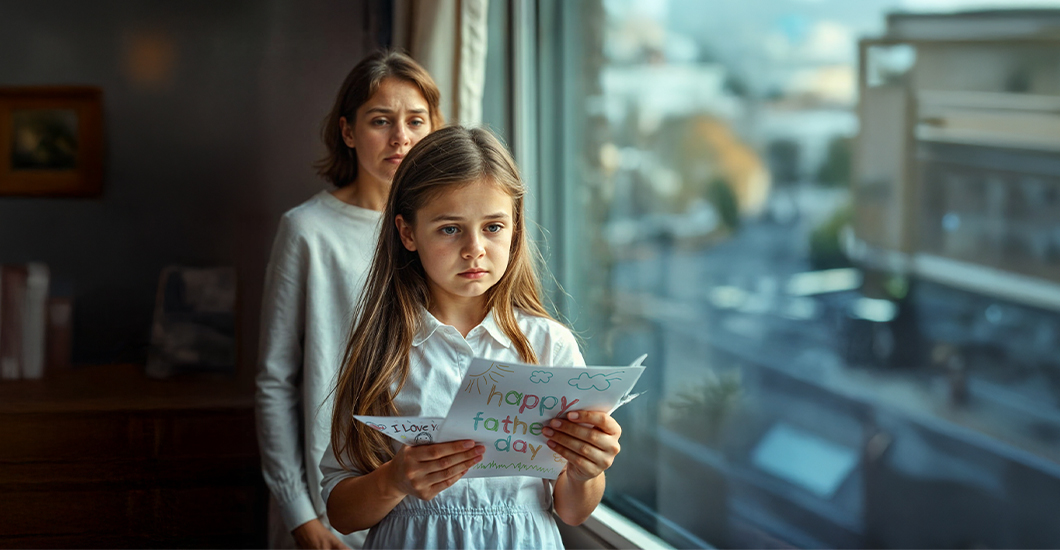
For years, my mother kept me from experiencing my father’s love, but I found a road back to reconcile with both of them, and myself!
No one wants to find out they have been lied to by someone they love and trust, but it happens. The first time this happened to me, I was a child growing up with my mother. I found a parcel of letters that I had written to my father spanning a considerable amount of time. They had never been sent. From the discarded bundle, I pulled a card I had made for him, which read ‘Happy Father’s Day, Dad, I love you,’ and felt a growing sense of anger and injustice rise above the confusion that touched me just moments after I found them.
When I approached my mother about the unsent letters, she was unconcerned, casually stating that she had known all along that I would be disloyal to her, and the letters to my father were proof of her suspicions about me—I had called him ‘Dad’ which meant, in her mind at least, that I had betrayed her. The anguish I felt upon discovering the truth was unbearable, not for myself, but for my father. The pain he must have felt, knowing that I never responded to the letters he wrote to me…And yet, I wondered why–after not hearing from me after all this time–he continued to write to me, telling me of his adventures abroad, his daily life, interesting things he had seen, or people he’d met. I’ll never forget the guilt I felt, knowing that my love for him was never understood. I felt betrayed. Words that I had reserved just for my father were infiltrated by someone else. I felt robbed of the right to know my father, and for him to know me.
Yet Another Lost-Love Story
Some thirty years later, I’d discover another Father whom I had been kept from. After learning the truth about God and the Catholic Church, I felt that I had been robbed of a relationship with my Father in Heaven, which left me with a temporary feeling of loss and guilt, followed by an even larger sense of unworthiness of His love—that He should continue to seek me out despite my absence in the relationship.
My life up to this point had prevented me from encountering and more importantly accepting God’s love and mercy. While I may have felt that I had been kept from knowing God, which in a way is true based on my upbringing, I now know that nothing has ever kept God from knowing me. The truth is, Our Father in Heaven wants all His children with Him, and He will stop at nothing to bring us home. All that is required from us is to surrender and give Him our yes.
My personal ‘yes’ made me realize that when we sincerely know the love of God, we align our hearts with His Sacred Heart and then, we can only love with His love. This supernatural love helps us see the woundedness in the people who hurt us. His merciful love helps heal our deepest wounds, bringing them one by one to the surface with the utmost tenderness, respect, and care…
His infinite love and mercy helped me to understand that forgiveness is not only about letting go of the hurt and anger, but also about releasing the burden of guilt and resentment that I had been carrying for so long. Through prayer and reflection, I began to see that just as my earthly father continued to reach out to me with love despite my silence, so too, my Heavenly Father continues to pursue me with unwavering love and compassion.
Why? Because He loved us first, and He knows us in the most intimate way.
Finding Forgiveness
It was through His grace that I was able to forgive myself for the years of lost love with my father. This supernatural love also led me to forgive my mother for the pain she had caused. God’s love showed me that I am worthy of forgiveness and redemption, regardless of past mistakes or hurts. And His love inspired in my heart that my mother too deserved the same forgiveness and redemption.
His love transformed my pain into a source of compassion and empathy, allowing me to see the beauty and potential for healing in every broken situation. Through the healing power of God’s love, I learned that forgiveness is not just a gift we give to others, but one that we give ourselves. It is a path to freedom and peace, a way to release the past and embrace the future with renewed faith and love.
It is my prayer that we may all be inspired by the boundless love of our Heavenly Father, who offers us forgiveness, healing, and redemption in abundance. May we, in turn, extend that same love and forgiveness to ourselves and to all those around us, creating a world filled with grace, compassion, and reconciliation.
'